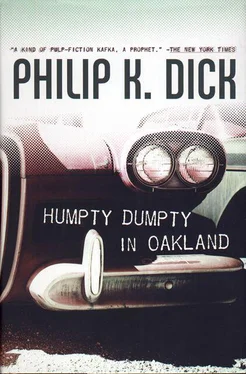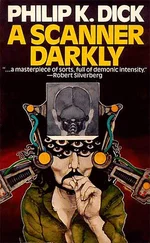To assist—but not guide—himself he had brought along an Anacin tin filled with pills. Now was the time. Opening the tin, he took out a flat green pill that looked like a candy heart; this one was a Dexymil, and he swallowed the whole pill, washing it down with Coke from a bottle he had brought along. Taking the Dexy made him feel better almost at once; it gave him a feeling of anticipation, because he knew, from experience, that before long a good mood would settle over him, and that out of this mood good things would come. But there was also the problem that, when he had taken a Dexy, he tended to talk too fast and too much. So to balance the little flat green candy-heart-shaped pill, he now swallowed down a round red shiny-coated pill, a Sparine, which looked like nothing so much as a ladybug with its feet drawn in. The Sparine was not a stimulant but a tranquilizer. He hoped that together the two pills would bring about the state he wanted, the state appropriate for what he was about to do.
For good measure he also took two Anacin tablets. And that was it; he closed the tin and put it away in this pocket.
The next he knew, he was crossing the street. Then he stood in a fluorescent-lit office, facing a girl at a desk and switchboard. The girl, pretty, young, with earrings, looked up and said, “Yes, sir.”
He said, “I want to see Mr. Teach.”
“Mr. Teach isn’t here,” the girl said. “He’s dead.”
“Dead!” Al Miller said, amazed. “What happened? I didn’t know him, but what the hell happened?”
“He was shot down in North Carolina,” the girl said. “By someone; I think his name was Mayhard or Maynard.” She waited, but he could think of nothing to say; he stood mutely in front of her desk. “You could see Mr. Knight,” she said. “He’s the manager. What was it about?”
“Okay,” he said, but then he remembered that it was not Mr. Teach that he wanted to see at all; he had gotten the name from the sign over the building. It was Chris Harman that he wanted to see. “I want to see Mr. Harman,” he said.
“Mr. Harman is tied up right now,” the girl said. “If you will give me your name and sit down, I’ll notify his secretary and find out for you if he has time to see you today.”
He gave the girl his name and then went to sit down on one of the modern office chairs.
In what seemed to him to be no time at all the girl began to beckon to him. He put down his Life and walked over.
“Mr. Harman has a few minutes to see you now,” the girl said. “He can squeeze you in, if it doesn’t take too long.” She pointed to a hallway. “The first office on the right.”
It was like a plastic and glass doctors’ office, with side cubicles. He found the office, and there sat Chris Harman.
“Good day, Mr. Miller,” Mr. Harman said pleasantly, indicating a chair. “What can I do for you?”
Seating himself, Al said, “I’m sorry to hear about Mr. Teach. As I told the girl, I didn’t know him, but I know the Teach catalog, and—”
“It happened a long time ago,” Harman said, smiling. “In 1718.”
“Beg pardon?” Al said. “Oh, I think I see.” He laughed. It was a gag or something. He could not follow it, so he let the subject go. “You’re in charge?” he said. “You own this place?”
Mr. Harman, smiling slightly, nodded.
“Listen,” Al said, “do you remember me?”
“I think I do,” Harman said. “I know I’ve seen you before.” He glanced down, and Al knew that Mr. Harman was inspecting his clothing, his cloth jacket, slacks, shoes, sports shirt. Sizing him up by what he wore.
“I’m a used-car salesman,” Al said.
Mr. Harman nodded. “Ah, I see,” he said.
“You remember, now?”
“I think so.”
“I’m a no-good crook,” Al said. “One of the worst used-car salesmen there is.”
Mr. Harman ceased smiling, and his eyes became larger. His mouth fell open slightly. “Oh, indeed?” he murmured.
“I feel I came here to be frank,” Al said.
“Please be,” Harman said.
“I do all the things I can to get a sale,” Al said. “It doesn’t matter one bit to me what condition the car is in, just so long as I sell it. Let’s face facts. The cars I have on my lot—”
“Yes,” Harman interrupted. “You have a used-car lot. Al’s Motor Sales. I remember now.”
“They’re turkeys,” Al said. “Dogs. They ought to be junked. Let me give you an example. Do you have the time?”
Harman nodded.
“I got in an ex-taxi cab the other day. The way you can tell is a cab always has four doors, and usually it’s either a Plymouth or a Studebaker. It’s got no accessories except a heater, and the cheapest car in the line. And they paint out the company name on the doors. And on the top there’s holes where they mounted the name-plate. So I knew this was a cab. It was a real wreck. It must have had three hundred thousand miles on it. I got it for a hundred bucks. I repainted it, cleaned it up, got it looking good, and then I made up a story to go with it.”
“You set the speedometer back?” Harman said.
“The odometer,” Al said. “Yes, back to eleven thousand miles. It was last year’s car.”
Harman lit a Benson and Hedges cigarette with a gold-inlayed cigarette lighter; he offered the box to Al, but he declined. He was too involved in what he was saying to want to smoke.
“What I said,” Al said, “is that it was my wife’s car.”
Harman gray eyes sparkled.
“I said she’s been driving it to school,” Al said. “She has a phobia about buses; she can’t stand to be shut in. I got it for her new from the Plymouth dealer up on Broadway; I got it wholesale, because I know the guy. So I can pass on the savings. I got it for her but we really didn’t need two cars. All she did was take it up to school once a day, and maybe shopping. And I had to wash and polish it: It just took up space in the garage on weekends, because when we went anywhere we took our Chrysler.”
“I see,” Harman said.
“So I finally told her we couldn’t keep it. I’d sell it and she could use the money for a vacation to Hawaii. So I wasn’t interested in making a profit. I’d let it go for thirteen hundred.”
“Did you sell it?” Harman said.
“Not the first time,” Al said. “Some guy came in, and I told him that. But he noticed that the car had been repainted, and that bothered him. I told him she picked the original color, elephant gray with pink, and she got tired of that right away and got the Plymouth people to repaint it during the original guarantee. But he noticed that the shock absorbers were no good, so he knew the car had been used a lot. Anyhow, I finally unloaded it.” He paused. “To a ubangi.”
“Pardon?” Harman said, cupping his ear.
“To a Negro.”
“Ah,” Harman said. “Ubangi.” He smiled.
“Naturally, he didn’t have cash. He put four hundred down. I financed it through my loan company across the street.”
Harman laughed.
“All I do is walk across San Pablo,” Al said, “to the West Oakland Guarantee Savings. I got twelve percent compound interest on the unpaid balance, including loan charges and other fees. And if we have to repossess the car, the ubangi is still liable for the entire unpaid balance. It’s a thirty-six-month contract. Actually, in all, the interest comes to a realistic twenty-four percent, because it’s what we call discounted.”
“I think I understand that type of interest,” Harman said. “I believe I’ve run across it.”
“So in all, I got almost two thousand dollars for the ex-taxi cab,” Al said. “Originally, it cost only about sixteen hundred, new. All I had to do was paint it and clean it. And when I painted it, I didn’t even have the rust sanded off, or the dents banged out; I had the dents filled with compound and painted over.”
Читать дальше










